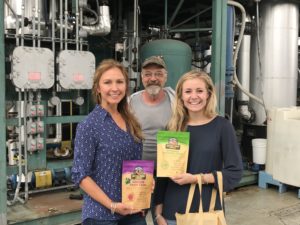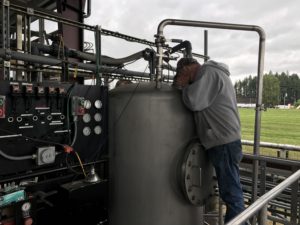Oregonians are innovators. We adopt good ideas first, from the bottle bill to the world’s best athletic shoes. Innovations in clean energy are no different — Oregon is on the cutting edge. Just take a look at Summit Natural Energy in Cornelius: they turn food waste into clean burning fuel for racecars.

Owner Mark Smith makes and sells dried fruit to companies we know and love, from Panera to Otis Spunkmeyer, and sell dried fruit directly to consumers through Sisters Fruit Company. Sisters Fruit Company offers a sweet and healthy alternative to processed chips. But in the process of making these great snacks, Mark discovered one big problem: creating dried fruit left behind a lot of waste juice.
Rather than be stuck with the large fee of transporting and disposing this juice, Mark put his food science training to use: he devised a plan to turn the juice into fuel. And thus, Summit Energy was born.
Ethanol is a clean burning fuel. It’s cheaper than gasoline, which causes some consumers to think it must not high quality. That couldn’t be farther from the truth. Ethanol actually has a higher octane rating than gasoline — meaning it performs even better than traditional gasoline. It’s devoid of the carcinogens and other toxic materials that traditional gasoline contains, and better for the environment because its carbon footprint is much lower. Ethanol provides high quality, high octane for exceptional engine performance and reduced emissions. That’s why it’s particularly perfect for racecars. The company sells their ethanol under the name Thunderbolt Racing.

Making ethanol is similar to making beer or wine; you begin by fermenting the waste product, adding yeast to convert the sugars into alcohol. From there you concentrate the alcohol. Each month, Summit Natural Energy produces 6,000-8,000 gallons, and is undergoing a gradual plant rebuild so that they can increase their monthly capacity to 20,000 gallons. The company recently completed a rebuild with two new high-efficiency boilers that add capacity and increase efficiency by automatically shutting down when not needed.
In addition to creating ethanol from waste juice, Summit Natural Energy also accepts donations of qualifying food to convert into ethanol from nearby companies. The foods just have to contain a certain portion of sugar. When we visited the plant, they were preparing to process expired jam. Summit Natural Energy has created clean burning ethanol from everything from pie jam and brownie mix to baby food. “It’s helpful for us and helpful for them,” says plant manager Dave McCoy. “They get to donate waste to us rather than paying to have it hauled away, and they get a tax receipt for making a donation. We get more product to turn into sellable fuel. These companies typically pay a lot to throw product away, but now they get a tax credit for each ton donated from the State of Oregon.”

McCoy has created and perfected the exact fermenting recipe to create the best ethanol for Thunderbolt Racing fuel. He understands the variables that can alter the recipe — like how each type of food processed requires its own recipe, based on its ingredients, and how the recipe can change depending on how cold or warm it is outside.
McCoy walked us through his process, showing us how the product goes from sweet-smelling fruity sludge to clear, clean ethanol. Standing in a factory that smelled like berries, we watched how centrifuges mix the contents during each stage of fuel development. At the end of the process you’re left with 200 percent proof ethanol; McCoy jokingly refers to it as “the purest moonshine you’d be sorry to ever drink.” Law requires that two percent of the product contain regular unleaded fuel — specifically so that it can’t be drunk. The final product is 98 percent 200 proof alcohol, two percent regular unleaded fuels. However Summit Natural Energy makes other blends, depending on the needs of who they’re selling to.
Oregon’s own Red Thunder Race Team has been using Thunderbolt Racing Fuel’s E-85 blend since 2013. Thunderbolt’s fuel has made the performance of its Blown Big Block Chevy 518, highly consistent. Each pass down the track at Woodburn Drag Strip has provided them with valuable data to assess performance and predict timing. They attribute this consistency to the Thunderbolt Racing Fuel, and also praise it for its low maintenance.
Summit Natural Energy’s story is but one example of how the clean energy revolution is unfolding in our state. Clean Fuels are offering an additional revenue stream, while reducing waste and increasing efficiency. They are a powerful example of how well clean fuels can work for Oregon, and how increasing the alternative fuel market will only prove fruitful — for Sisters Fruit Company and far beyond.
